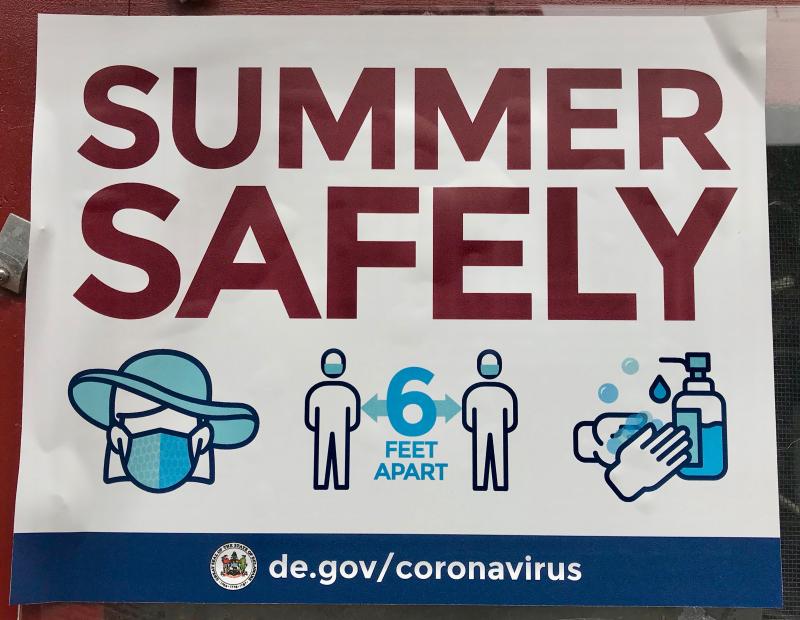Street theater, Prime Hook visitors, Sussex COVID-19 stats
A block away from downtown Lewes, a recent Sunday afternoon.
The setting for this street theater is the rear of the blacksmith shop, eerily empty after decades of its walls, floor, ceiling – inside and out – being paved, papered, hung, stacked, nailed, piled, glued and otherwise completely filled with everything imaginable; none of it new, some of it – like stone arrowheads – as old as the ages.
The blacksmith – nearing the end of an epic relocation – is relaxing in the late afternoon sun.
Above him, hanging from a steel beam, is a large Trump flag moving lazily in a light breeze.
The artist Abraxas, who has a studio one block over on Second Street, stands a short distance away on the sidewalk.
In the middle of the lightly traveled street stand a man and woman in their 50s chatting with the dynamic duo. The Trump flag caught their attention. So too did the blacksmith’s no mask zone sign.
I arrive, observe and listen. Lots of liberty chatter, the woman saying they were happy to stumble across the scene.
“We were getting discouraged. Everyone in town wearing masks. On the sidewalks and in the stores. We were thinking we didn’t really want to be in this town. But we’re so glad to be talking with people who see it differently.”
Abraxas has been publicly vocal about his distaste for Gov. John Carney’s heavy hand during the pandemic in terms of masks and business restrictions.
Blacksmith John noted that his Trump flags, according to town officers he knows, generated phone call complaints to the police department, as if they are somehow illegal, that somehow the First Amendment doesn’t apply in Lewes.
Both have been visited by state officials checking out complaints that neither was complying with guidelines.
“A nice woman came by and checked me out,” said Abraxas. “She saw that we social distanced, had hand sanitizer available, complied with masking in public areas, and found no problem. That was the last I heard of that.”
John confirmed. “She came over here next,” he said. “I agree she was very nice. Took a look around, saw that nothing was amiss or threatening in terms of the virus, and went on her way. She said she saw no problem. I haven’t heard anything further either.”
The visitors took exception to the strict masking rules in the busy parts of downtown, during the busiest parts of the day. “It made us uncomfortable. Made us not want to stay.”
I listened; chimed in that for me it’s a matter of common sense. “If the store requires a mask, I wear a mask. I social distance, and I stay away from crowds of people not wearing masks and not social distancing. It’s not that difficult. I don't want to catch that stuff. It’s bad.”
Later I reflected on the conversation.
It would be easy to say that such restrictions are bad for business, discouraging people like the visitor couple from coming or staying in resort towns like Lewes and Rehoboth Beach that are trying to keep conditions safe.
But then I thought about the days when smoking was just starting to be banned in restaurants and bars. People squawked that such a ban would be bad for business. But what happened? Restaurants became more full than ever because the people staying away previously because of unhealthy cigarette smoke started going out to eat more.
People are attracted to clean, healthy, attractive and safe places. The smoking ban, for the most part, turned out to be a positive for the restaurant industry.
Isn’t the same true for the masking restrictions? Who wants to hang out on the crowded streets of a resort town’s commercial district in the middle of a pandemic if they fear that they could catch a deadly disease because people aren’t taking common-sense precautions? They won’t come if they think it’s unsafe for themselves, their children, their parents and grandparents.
There’s always a common-sense middle ground, and that’s what we should pursue, relentlessly.
Prime Hook visitors
Residents and visitors clearly see Prime Hook National Wildlife Refuge east of Milton as a clean, attractive and healthy place to spend time. Refuge Manager Art Coppola this week said the number of visitors driving the roads, canoeing the creeks and hiking the trails of the 10,000-acre refuge is up at least 25 percent above numbers being recorded prior to the coronavirus pandemic. “They have cabin fever; they want to be outside and they want to be safe. They see this as a safe place,” he said.
Coronavirus statistics
As of Monday, Oct. 5, there have been 21,466 documented cases of coronavirus in Delaware since the state started keeping pandemic statistics back in March. Those cases have resulted in 646 deaths, 210 of them in Sussex County where there have been 7,050 documented cases.
The 19970 ZIP code, in the southeastern corner of Sussex around Fenwick Island, has the lowest incidence in Sussex at 174 cases per 10,000 people, or 1.74 percent of the population. Next lowest is the 19958 ZIP code, around Lewes, where the rate is 278 cases per 10,000 people, or 2.78 percent of the population.
The highest incidence in Sussex continues to be in the 19947 ZIP code around Georgetown, which currently has a rate of 846 cases per 10,000 population, or 8.46 percent. Rehoboth Beach’s 19971 ZIP code shows the county's second-highest rate at 536 cases per 10,000 people or 5.36 percent.
My final comment: The coronavirus is still very much among us. Be careful all the time, get outside, and be happy.






















































